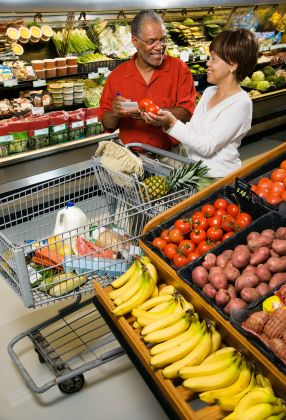Grocery Shopping
Strategies for healthy grocery shopping
Since most of us don't grow our own food these days, grocery shopping is one of those activities that is a necessary part of our lives. I don't know many people who enjoy this chore, but there are some ways to make it easier and to insure that you buy the best foods for yourself and your family.
(1) Make a list of the foods you need based on the meals you have planned. Keep a pad of paper and pencil in the kitchen to jot down items that you use up or that you think of as you are cooking or planning.
(2) Don't buy coupon items unless they are products you would normally choose. In spite of what all the frugality experts say, it isn't saving money to buy a product that you would not normally use, especially if it is overly processed or junk food that should never find its way into your cart, in any case. My experience is that most whole, unadulterated foods rarely show up as coupon items, unless they are local store promotions.
(3) Stick to the perimeter of the store. When you shop at the supermarket, do most of your shopping on the outside aisles. This is where you will find much of the whole, unprocessed food. The inner aisles are where most processed and junk foods reside. If you mostly avoid those aisles (Okay, you have to venture there to get your brown rice and lentils!), you won't be tempted by the brightly-packaged junk food.
(4) Eat before you go shopping, so that you aren't tempted to buy sugary or salty junk foods. An empty stomach is directly correlated to weak will power. The store has all kinds of strategies to encourage you to buy more. Everything from the background music, to store layout, attractive displays, and signs telling you about "specials" is designed to get you to stray from your planned purchases. Don't let hunger make you easier to manipulate!
Interesting Fact: With some processed foods, more is spent to make the packaging attractive, than is spent on the product inside the packaging!
(5) Read labels on food packages and choose the products made from real food. The rule is that if you can't pronounce the ingredients, leave it on the shelf. Also look for excessive sugar (by all its names) and high sodium content and skip those foods that have either.
Click here for a list of other names for sugar found on food labels.
(6) Buy food packaged in jars rather than cans or plastic, whenever possible, due to concerns about BPA used in the linings of cans and chemicals used in plastic containers.
(7) Stock up on staple foods when they are on sale. In this way you can save money and extra trips to the grocery store!
(8) Buy organic, especially meats, eggs and dairy products since these are the most concentrated sources of hormones, pesticides and other chemicals that may harm your health. Even if you can't buy all organic, buy what you can. Every little bit helps!
Click here for a list of fruits and vegetables that you should buy organic, if possible.
Grocery Shopping - Do it well
Unless you can afford a personal shopper or you eat out all of the time, grocery shopping is unavoidable. The good news is that if you do the food shopping, you can insure that only the healthiest and best foods find their way into your shopping cart and cupboards.


